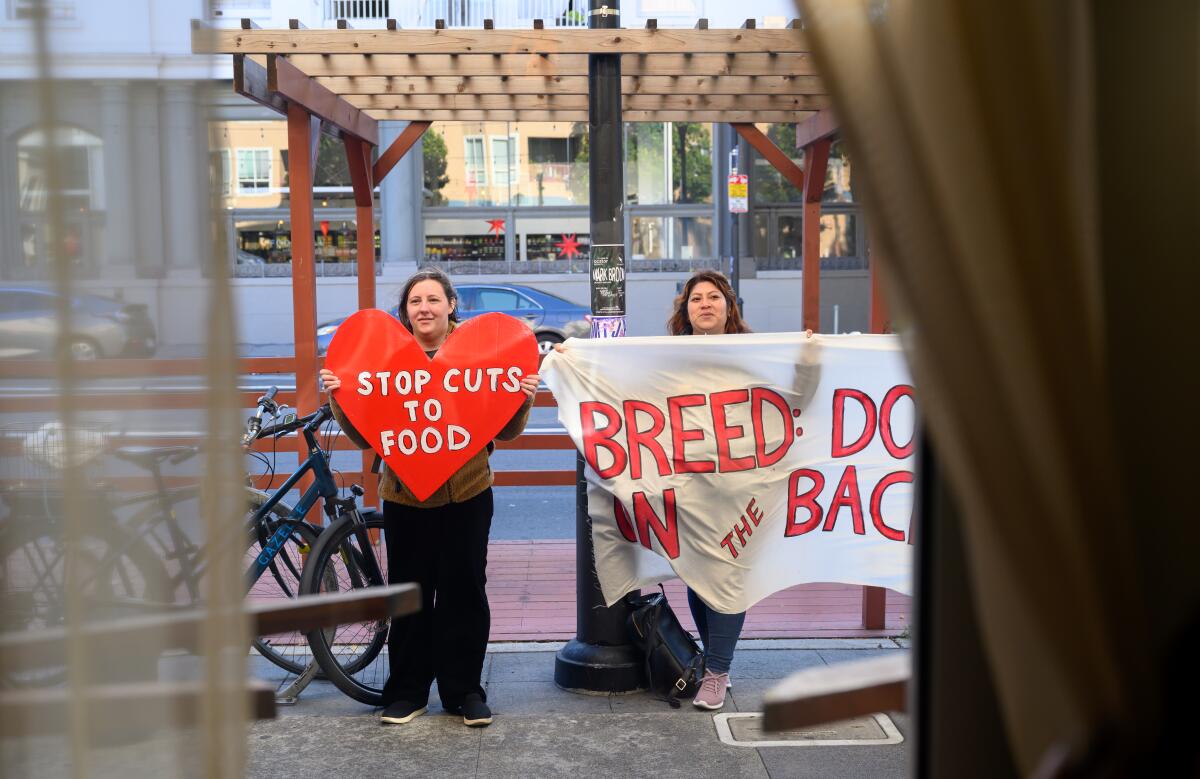San Francisco –
Karen Bass and London Breed made history by breaking the glass ceiling in their respective cities when they were elected as the first female mayor of Los Angeles and the first Black female mayor of San Francisco.
They have many other similarities, including a promise to reduce homelessness, a plan to ease the opioid overdose crisis and voters concerned about crime as powerful Democrats leading major California cities.
But the way the two mayors tackle urban issues reveals striking differences between them.
Breed, 49, has supported tough-on-crime ballot initiatives statewide, which Bass, 70, has not. The San Francisco mayor has also worked to increase criminal penalties for fentanyl dealers and require drug testing and treatment for certain welfare recipients. The Los Angeles mayor has not weighed in on those issues in regards to county-overseen funding.
They’re also divided over a high-profile Supreme Court case that could make it easier for cities to remove homeless camps: Breed welcomed the court’s review, while Bass warned of a decision that “could embolden those who want to criminalize homeless Angelenos.”
“The reason I’m running is because of homelessness,” Bass said during a panel at Manny’s, a civic engagement cafe in San Francisco, on Monday. “The No. 1 thing is we need to get homeless people off the streets as quickly as possible because people are dying. But the problem in Los Angeles is the numbers are enormous.”
This was the first time the two mayors spoke publicly one-on-one, as they discussed the challenges they face leading two of California’s most well-known and influential cities.

“Homelessness is why I’m running,” Los Angeles Mayor Karen Bass said.
(Josh Edelson/The Times)
Los Angeles, a city of 3.8 million, has about 46,000 homeless people, while San Francisco, with a population of 808,000, has an estimated 8,323 homeless people.
Breed said San Francisco’s issues are “a little bit different.”
The city has increased shelter capacity and helped 15,000 people escape homelessness, but it faces challenges with an increasing number of people refusing housing and shelter, Breed said.
“The biggest problem is fentanyl, the opioids,” she said. “Getting people off the streets has been our biggest challenge.”
Political differences between LA and San Francisco
Breed and Bass have different positions as mayors, which may explain their policy differences: Breed, who served as San Francisco’s mayor for six years, is up for re-election this year in a tough battle against four strong challengers.
In contrast, Bass, who described herself as a “rookie” on Monday, is still in the honeymoon phase after winning the November 2022 election.
“There seems to be this kind of doom and gloom narrative in San Francisco, but Los Angeles residents don’t seem to care as much about it,” said Jason Ward, an economist at the RAND Corporation in Santa Monica.

Mayor London Breed supports tough-on-crime strategies to address San Francisco’s problems of street homelessness and outdoor drug use.
(Josh Edelson/The Times)
As Mayor Breed’s political agenda has grown over the past two years, she has turned to a hard-line strategy on crime, cracking down on street homelessness, outdoor drug use and other public safety issues that she once described in a speech as “the bandits that have destroyed our city.”
Bass, whose strategy has drawn both praise and criticism as she seeks a compassionate approach to homelessness without losing support from the business community, has not endorsed a candidate in the fierce Los Angeles district attorney race that pits a so-called law-and-order candidate against a progressive incumbent.
In some instances, the two politicians are offering the same blueprint for solving their cities’ problems.
Governor Breed declared a state of emergency in the drug-ridden Tenderloin neighborhood in December 2021, and Governor Bass did the same a year later on homelessness. Both efforts were aimed at getting people off the streets and increasing their access to resources.
Both mayors have rejected calls to cut police budgets and added more money to their city budgets for law enforcement despite opposition from left-leaning voters. Both have also spent much of the last year focusing on solving homelessness with temporary shelter beds, as well as investing in addiction and mental health services.
But the very differences in their policies illustrate the different ways city leaders are trying to solve some of California’s most vexing problems.
“It’s a good thing that more women are running for office,” said Elizabeth Ashford, a Democratic strategist and director of California Women Lead, a group that works to get women elected. “Leadership merit will determine whether they rise or fall.”
As Black women, both mayors said their identities have shaped their experiences in politics.
Bass said Los Angeles’ black population is “fairly small” at about 8 percent, and she believes that leads people to misunderstand her.
“It doesn’t matter if you underestimate them,” she said, “because they won’t expect it!”

San Francisco Mayor London Breed and Los Angeles Mayor Karen Bass discussed the challenges facing their cities at Manny’s Cafe in San Francisco.
(Josh Edelson/The Times)
Breed said she faced similar challenges in leading San Francisco, where the city’s population is less than 5% Black.
“I’ve had to have some really tough conversations with a lot of privileged people in this city who have spoken to me as if I was less than them,” Breed said.
“It’s special to have an African-American woman leading a major city. Everybody wants their mayor to do a good job, but the challenges we face are sometimes different.”
Different approaches to fighting crime
Blade earlier this year sponsored a Republican-backed measure on the November ballot that seeks to repeal parts of Proposition 47, a 2014 voter-approved measure that reduced theft and drug-related felonies to misdemeanors. The measure would increase penalties for fentanyl dealers and organized retail theft rings and require treatment for drug users.
Bass said he does not support efforts to repeal Proposition 47.
In a statement to The Times, she said the legislation “has pros and cons and should be evaluated the same way the impacts of any policy are examined,” but did not say how her office should analyze the policy.
Anne Irwin, president of Smart Justice California, a group that advocates for progressive reform of the criminal justice system, said the mayors’ approaches “couldn’t be more different.”
Irwin said Bass “has learned the lessons from the tough-on-crime era and accepted the harsh reality that it didn’t work.” Breed, he said, has reverted to “familiar political rhetoric” that satisfies voters in the short term but undermines public safety in the long term.
“That’s why I call it an easy, quick fix,” Irwin said, “but it’s not leadership.”
Irwin acknowledged that many San Franciscans want a tougher approach to public safety issues, but he blamed Breed’s waning voter support on her inconsistent and disorganized approach to solving those problems.
“For the past few years, San Franciscans have watched Mayor Breed change course from one initiative to the next based on the biggest news of the week,” Irwin said.

People outside the event were protesting San Francisco Mayor London Breed’s proposed budget cuts, including funding for child care programs and food banks.
(Josh Edelson/The Times)
To Breed’s supporters, she is making tough decisions for the city she loves.
Breed grew up in the Western Addition area, raised by her grandmother during a tough childhood marked by poverty, gang violence and street crime. She lost her sister to a drug overdose nearly 20 years ago, and her brother has served more than 20 years in prison for armed robbery and other crimes.
“I think London Breed has had extensive experience living that kind of life and she has taken the steps necessary to keep our residents safe,” said former San Francisco Mayor Willie Brown, who made history as the city’s first black mayor and previously served as state Assembly speaker. “That’s what you expect from a mayor.”
Bass has focused almost exclusively on homelessness for much of his term, as he promised during his campaign. His “Inside Safe” program, which houses homeless people in hotels, motels and other shelters, has removed 2,720 people from street camps, officials said.
She also issued an order dramatically speeding up city approvals for housing projects that are deemed 100 percent affordable. In April, she said the city had more than 16,000 affordable housing units in its plans.
Bass grew up in the Venice-Fairfax neighborhood of Los Angeles and volunteered for Senator Robert Kennedy’s presidential campaign at age 14.
She founded the Community Coalition, a nonprofit focused on addressing the structural racism that led to neglect in South L.A. A former emergency room physician assistant, she served on the council for more than a decade before being elected mayor.
She has tried to strike a delicate balance between helping people get into shelters and housing and responding to complaints from businesses and neighbors about tents and drug use.
She has had little to no involvement in the debate over a policy that would give city council members the option to ban homeless camps within 500 feet of schools and parks, a law that has come under attack from the council’s most left-leaning members, who condemn it as a waste of police resources.
Bass suggested in an interview that the law would simply displace homeless encampments, but said he would not call for the law to be repealed.
Sam Tsemberis, CEO of Pathways Housing First Institute in Santa Monica, said the mayors’ responses reflect frustration in their respective cities.
“It comes down to personal attitudes and values,” Tsemberis said, “and for politicians, what’s in their favour in terms of their chances of reelection.”

